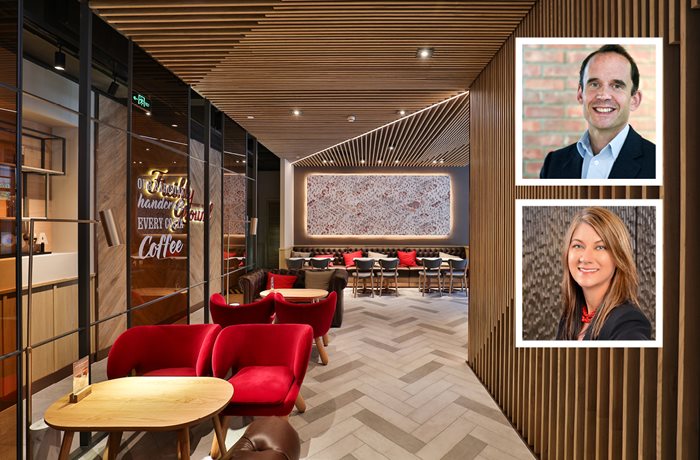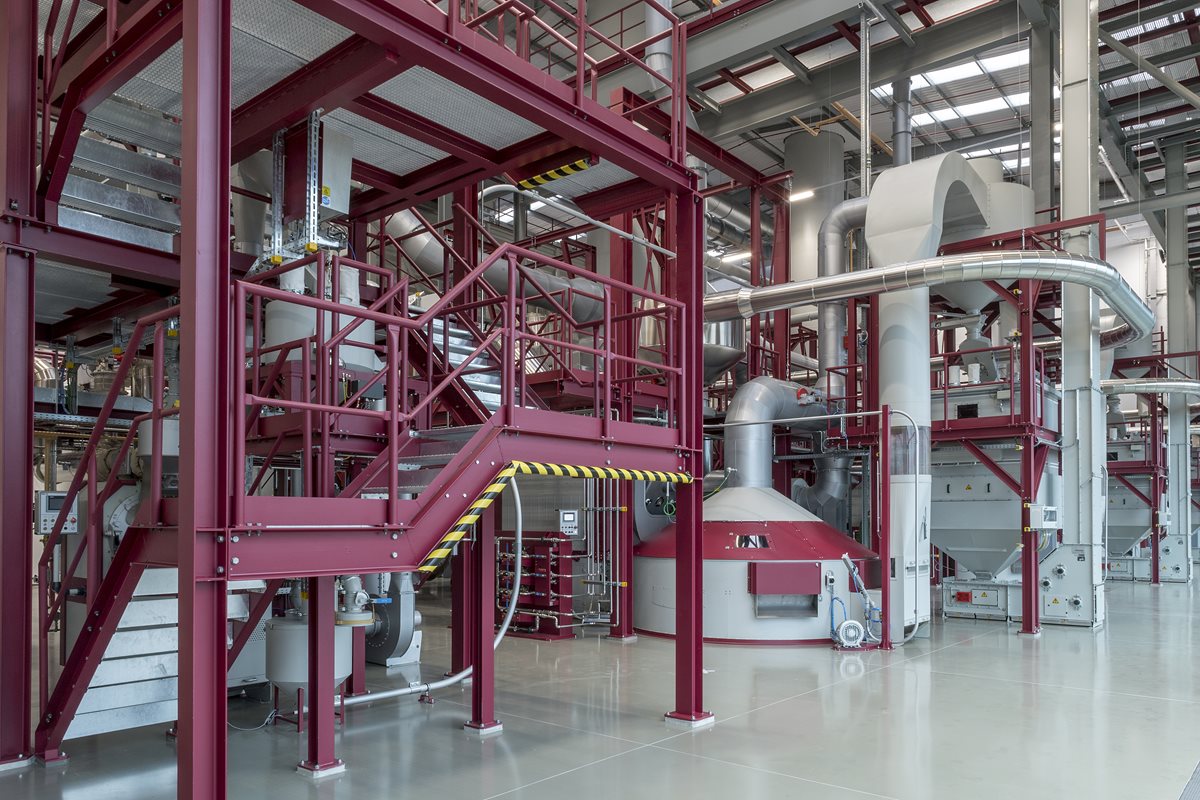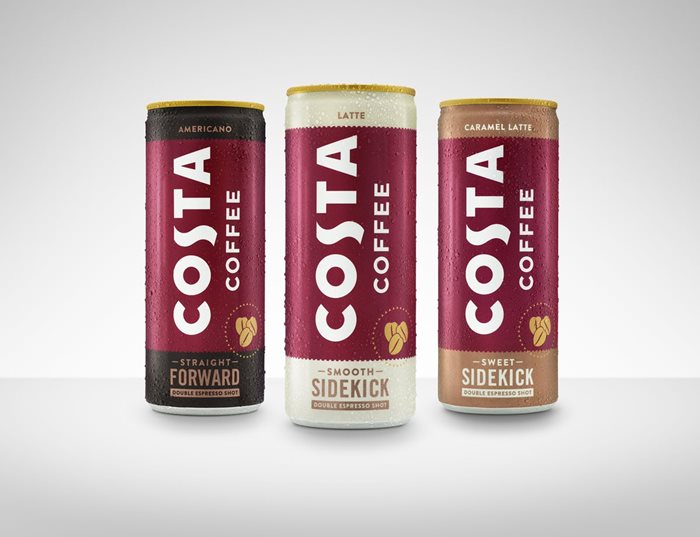We examine Coca-Cola’s landmark acquisition of Europe’s largest café chain and British coffee icon, Costa Coffee, and why synergies between coffee shops, retail and ready-to-drink products look set to shape a new era in the global coffee market

Main image: A Costa Coffee store in Shanghai, China. Inset: (Above) Dominic Paul, CEO, Costa Coffee, (below) Jennifer Mann, President, Coca-Cola's Global Ventures Group (GVG)
Legend has it pharmacist Dr John Pemberton was inspired to develop a pain-soothing tonic after sustaining wounds in the American Civil War. A rousing infusion of alcohol, coca leaves and caffeine derived from kola nuts, Pemberton’s French Wine Coca was the earliest incarnation of the revivifying beverage known today as Coca-Cola.
While the modern-day drink employs a much gentler recipe for refreshment, Coca-Cola’s closely guarded formula has become one of the most recognisable and widely consumed beverages on the planet. Today, Coke’s iconic script logo flies the flag for a vast network of more than 500 soft drinks brands available in almost every country in the world, with some 1.9 billion servings sold daily.
The three billion-plus cups of coffee consumed globally every day represent the last piece of the puzzle in Coca-Cola’s quest to become a ‘total beverage’ company. With the International Coffee Organisation (ICO) pegging annual worldwide coffee consumption at around 10 million tons and the global coffee bean market estimated to be worth over $100bn, it is easy to see why in 2018 Coca-Cola made its landmark
£3.9bn ($4.8bn) acquisition of Europe’s largest coffee chain, Costa Coffee.
Costa Coffee: British icon, global brand
Founded as a wholesale coffee business by siblings Sergio and Bruno Costa in 1971, Costa Coffee played a central role in defining and developing contemporary coffee culture in the UK. Just like Coca-Cola, Costa has its own closely guarded signature recipe – the Mocha Italia Signature Blend that is the foundation for all its espresso beverages. The tongue of Costa’s Master of Coffee, Gennaro Pelliccia, is famously insured for a tasty £10m.
"We have a long track record of disrupting the UK coffee market through different formats and channels"
– Dominic Paul, CEO, Costa Coffee
Costa Coffee was a Second Wave pioneer of espresso-based coffee, barista service and takeaway service at scale during the 1990s and played a key role in popularising the culturally authentic Italian café experiences now firmly ingrained in UK consumer lifestyles.
As Costa has helped to shape the character of the UK branded coffee shop segment, it has also won the hearts and minds of the British public. For nine consecutive years the coffee chain has been crowned ‘The Nation’s Favourite’ coffee shop in Allegra’s annual UK consumer survey. In 2018 Allegra research indicated Costa Coffee stores made up nearly one third of the UK’s £10.1bn branded coffee shop market.
More than a British icon, Costa is a revered global brand with 4,000+ stores and a network of over 9,000 Costa Express vending machines across 32 markets. Today, the company continues to drive market innovation through a diverse range of coffee products and in-store experiences such as its digital loyalty app and mobile ordering.
“We have a long track record of disrupting the UK coffee market through different formats and channels, whether that’s through Costa Express or our range of in-home Costa Coffee products,” says Costa Coffee CEO Dominic Paul. “Providing more choice for consumers is in our DNA, ensuring we provide a Costa Coffee to our customers whatever the occasion,” he adds.
With its significant cultural capital, brand penetration, global infrastructure and potential for scalability, Costa Coffee is clearly an attractive investment for any firm seeking share in today’s highly opportune coffee market. This was certainly the case when UK brewery and hospitality firm, Whitbread, purchased Costa’s fledgling 41-store UK portfolio in 1995 for £19m. Over the next 24 years, the coffee chain’s value would increase 205-fold.
Following the landmark 2018 acquisition, Coca-Cola’s Global Ventures Group (GVG) has been tasked with scaling and leveraging best performance from Costa’s multiple product channels. Far from assimilating Costa Coffee into its brand portfolio, Coca-Cola has opted to harness the coffee chain’s skills and infrastructure by learning from its extensive expertise, fostering a relationship Coca-Cola CEO James Quincey has described as ‘connected but not integrated.’
-045-(003).jpg.aspx?lang=en-GB&width=700&height=466)
Costa's £38m UK roastery produces 45,000 tons of coffee annually and supplies the company's global portfolio. © Costa Coffee
“Coca-Cola has been very respectful of our brand and our heritage. Our operating model means that we’re connected to Coca-Cola, but not integrated within it. That’s important because we can benefit from Coca- Cola’s support, while continuing to operate as the Costa Coffee brand that customers know and love,” says Costa’s Paul.
It’s a partnership that holds the potential to supercharge growth for both firms across café, vending and retail segments in international coffee markets that could otherwise prove difficult for each firm to navigate in isolation.
“Costa is a good fit – and the best way – for Coca-Cola to add a global coffee platform that will complement our existing systems,” says Global Ventures Group President Jennifer Mann. “Coffee is one of the fastest-growing beverage categories in the world. It is also a category with many different elements, from vending to coffee shops to roast-and-ground to instant to pods and capsules. Today, with the growth in coffee and hot beverages, it is more important than ever that Coca-Cola makes a serious and significant investment in the category, because it’s the right thing to do to serve our consumers with more of the drinks they want.”
Coca-Cola’s purchase of Costa Coffee forms part of a global trend of coffee market consolidation blurring the lines between hot beverages, soft drinks, cafés and retail. As coffee investments become increasingly lucrative, large conglomerates, such as Nestlé and JAB Holdings, are vying for supremacy across burgeoning growth categories, such as premium coffee and ready-to-drink (RTD) products.
“Coffee is a big business with many formats. It’s also a very fragmented business. No single company in the world has a strong foothold across all parts of coffee. This presents a huge opportunity for Coca-Cola,” says Mann.
Putting a price on excellence
When the Costa Coffee acquisition was announced in August 2018, analysts at Credit Suisse suggested Coca-Cola had paid too high a premium, valuing the UK coffee chain at £2.5bn ($3bn). Yet compared to the $7.1bn Nestlé paid to license Starbucks-branded retail products in 2018, Coca-Cola has not only acquired Costa’s branding rights but also the business’ substantial intellectual and material assets. These include nearly half a century of coffee knowledge, and crucially, scaled coffee self-sufficiency. Opening in 2017 after two years of construction, Costa’s £38m UK roastery produces 45,000 tons of coffee annually and is the beating heart of its global retail operations.
"One of the strongest opportunities we see is to expand the availability of Costa Express with our customers in places around the world"
– Jennifer Mann, President of Coca-Cola's Global Ventures Group (GVG)
As Mann puts it; “Costa is an incredible British success story. The team has built a successful brand and business with proper coffee at its heart. They are experts when it comes to coffee.”
We are only beginning to see how Coke is harnessing Costa’s significant global resources and knowledge. The deal gives the US beverage giant a strong coffee platform in more than 30 countries across Europe, Asia- Pacific, the Middle East and Africa, across which Costa already has an established retail presence. Since the 2018 acquisition Coca-Cola has already added 1,200 Costa Express self-serve machines to Costa’s pre-existing 8,000+ global portfolio.
“One of the strongest opportunities we see is to expand the availability of Costa Express with our customers in places around the world. This is an example of bringing together the strengths of the Coca-Cola system and Costa Coffee,” says Coca-Cola’s Mann.
Another high-profile development has been the launch of Costa Coffee’s hotly anticipated RTD coffee range. With Coke’s soft beverage marketing acumen and bottling infrastructure and Costa’ highly respected coffee credentials, RTD is an eloquent fusion of each firm’s expertise. “We are looking to combine the great coffee knowledge at Costa with our marketing expertise, global scale and distribution credentials,” adds Mann.
Waking up to smell the coffee competition
Coca-Cola is far from being the only international firm investing in the growing popularity of RTD coffee globally, a market predicted by some estimates to be worth $12.6bn by 2024. Eyeing long-term segment growth, in mid-2018 Starbucks signed a 21-year RTD partnership with international dairy cooperative Arla Foods to distribute Starbucks-branded RTD coffee products in the EMEA region. 2018 also saw international food and beverage firm Nestlé launch Nescafé Azera nitro coffee in the UK, while Coca-Cola’s arch-rival, Pepsico, launched Lavazza-branded RTD coffee in July 2019.
It’s unsurprising then, that Coca-Cola plans a big push into this fast-growing and relatively undeveloped coffee segment. 2020 will see Costa Coffee RTD launched in at least 10 new markets, including Bulgaria, Greece, Hungary, Poland, Romania, Russia and Switzerland.
RTD is just one beverage channel experiencing intensifying competition as multinational firms wake up to smell the premium coffee opportunities. Coca-Cola also faces stiff competition from a range of scaled rivals pivoting global growth strategies toward coffee shops and retail coffee channels, such as pods and capsules, especially on its home turf in the US.

Costa Coffee stores in the UK (L) and China (R). The company has over 4,000 stores and 9,000 vending machines across 32 markets. Image © Costa Coffee
Herein lies one of the biggest challenges for Coke’s global coffee strategy. Costa may be a revered global brand, yet except for a brief trial in Canada that was discontinued in 2016, the coffee chain is virtually unknown in the Americas. In the US, Costa faces an uphill struggle to garner brand recognition in a crowded market dominated by market leaders Starbucks and Dunkin’, which already hold two-thirds of the branded coffee chain market between them.
German conglomerate, JAB Holdings, is also exerting significant influence in the US. Since the early 2010s JAB has amassed nearly 30 café and retail coffee brands. With a portfolio containing established businesses such as Panera Bread, Peet’s Coffee, Stumptown Coffee Roasters and Caribou Coffee, Allegra research reveals JAB is now the third-largest branded coffee chain business in the US. Combined, Starbucks, Dunkin’ and JAB control a princely 80% share of the US branded coffee shop market.
Furthermore, the $18.7bn amalgamation of JAB’s soft drinks and retail coffee businesses in 2018 to create Keurig Dr Pepper is recasting coffee in the US soft drinks market. This is enabling JAB to push coffee products further and faster through Dr Pepper’s retail channels, which is now the third-largest beverage distribution company in the US behind Pepsico and Coca-Cola.
For these reasons, at least in the near-term, it makes sense for Coca-Cola and Costa Coffee to focus on the latter’s strong UK and European presence, as well as growth markets in the Middle East and China, both of which represent “huge potential” according to Costa’s Paul.
"By combining our resources and expertise we can become a world leader in coffee"
– Jennifer Mann, President of Coca-Cola's Global Ventures Group (GVC)
Allegra research shows the Middle Eastern coffee shop market grew 7.8% in 2018, with Costa Coffee the third-largest branded coffee chain and holding a 4.5% outlet share across the region. In China, Costa Coffee posted strong 2018 sales and plans to operate 1,200 stores by 2022.
“We intend to grow within those markets where we already have a presence along with selective expansion into new markets,” explains Paul.
While international growth across retail products and self-serve are important for Costa, Paul reiterates that brick and mortar stores will always play a core role in the Costa Coffee experience, especially in its flagship UK market. “Our store portfolio remains very important to us, as does the role we play across thousands of high streets and communities within the UK. We continue to invest in our stores and develop new formats, fit for purpose in areas such as travel locations. The growth in both RTD and our Costa Express machines means we can provide customers with convenient access to their favourite Costa, wherever they are and whatever the occasion.”
Breaking new ground
As the third-largest beverage company in the world by sales, Coca-Cola is a formidable entrant to the global coffee market. If there was any doubt as to the scale of Coca-Cola’s coffee ambitions, Mann is clear about her firm’s vision for Costa Coffee:
“Our ambition is nothing short of making Costa the world’s favourite coffee brand. While we have scale and distribution, Costa Coffee brings expertise and coffee heritage, which will enable us to compete on a global scale. By combining our resources and expertise we can become a world leader in coffee,” she says.
Clearly, Coca-Cola has its work cut out across the fast-paced and highly competitive global coffee market, but its diversification strategy appears to be working. The beverage giant’s 2019 half-year results saw net revenues climb 6%, with the Costa acquisition cited as a key component of the positive results.
With the global appetite for an ever-broader range of coffee products showing no sign of cooling, brand cross-pollination looks increasingly likely to shape the global coffee industry for years to come. Yet even as distinctions between coffee, soft drinks and energy drinks become increasingly blurred, a highly regarded premium coffee offer remains the vital component for capturing booming global demand.

Costa Coffee's range of RTD coffee range launched in June 2019. Image © Costa Coffee
“We believe Costa Coffee is exceptionally well placed to benefit from the growing coffee trend as our brand is truly centred on coffee quality and expertise,” says Costa’s Paul.
“We continue to invest in our digital platforms, delivery partnerships, new product innovation and our store environments – providing our customers with their favourite Costa product whatever the occasion.”
The Allegra view
Combining the extensive skillsets of both firms makes sound strategic sense. Costa Coffee has the heritage, assets and expertise to deliver the expectations of increasingly sophisticated global coffee audiences, while Coca-Cola wields immense marketing firepower and global beverage distribution knowledge.
Until now, both firms have had major gaps in their respective market approaches and this deal should open doors to new markets opportunities around the world.
For Coca-Cola, the deal has delivered a credible coffee offer within its immense beverage portfolio, while Costa Coffee can now realise true global success beyond the UK and a handful of select international markets.
Together the two entities can achieve greater opportunities across physical stores and premium vended coffee solutions, as well as the fast-growing RTD coffee segment. This looks like a commercial arrangement made in heaven – and a timely one at that.
Now, with a supercharged investment and cross-channel global expansion strategy, only time will reveal the limits of what these titans can achieve together.
From an article originally published in Issue 2 of 5THWAVE.
Subscribe to 5THWAVE to receive each edition in print and digitally or sign up to our newsletter and be the first to read the latest articles and updates on World Coffee Portal research
